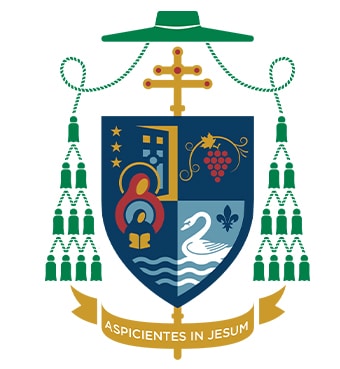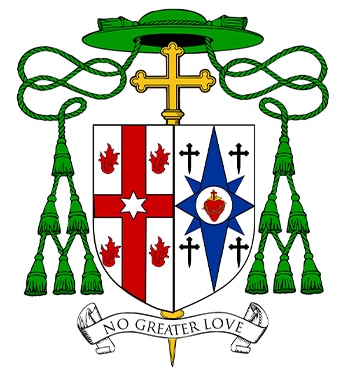Peggy Stanton’s Notes – 2nd Sunday of Easter
APRIL 7..Gospel of JOHN: 19-31
From the Catechism…
paragraph 645…
By means of touch, and the sharing of a meal, the risen Jesus establishes direct contact with his disciples. He invites them in this way to recognize that he is not a ghost, and above all to verify that the risen body in which he appears to them is the same body that had been tortured and crucified, for it still bears the traces of his passion. Yet at the same time this authentic, real body possesses the new properties of a glorious body: not limited by space, and time, but able to be present, how, and when he wills; for Christ’s humanity can no longer be confined to earth and belong henceforth only to the Father’s divine realm. For this reason,too,Jesus enjoys the sovereign freedom of appearing as he wishes: in the guise of a gardener, or in other forms, familiar to his disciples, precisely to awaken their faith.
Paragraph 659….
(Referring to the Lord’s glorified body) says it was glorified at the moment of his resurrection, as proved by the new and supernatural properties it subsequently and permanently enjoys. But during the 40 days when he eats and drinks familiarly with his disciples and teaches them about the kingdom, his glory remains veiled under the appearance of ordinary humanity. Jesus’ final apparition ends with the irreversible entry of his humanity into divine glory, symbolized by the cloud, and by heaven, where he is seated from that time forward at God’s right hand. Only in a wholly exceptional and unique way, will Jesus show himself to Paul, as to “one untimely born” in a last apparition, that established him as an apostle.
Paragraph 1042…. at the end of time, the kingdom of God will come in its fullness. After the universal judgment, the righteous will reign forever with Christ, glorified in body and soul. The universe itself will be renewed.
The Church…. will receive her perfection only in the glory of heaven, when will come the time of the renewal of all things. At that time, together with the human race, the universe itself, which is so closely related to man, and which attains its destiny through him, will be perfectly re-stablished in Christ.
Paragraph 730…
At last Jesus’ hour arrives: he commends his spirit into the Father’s hands at the very moment, when by his death, he conquers death, so that “raised from the dead by the glory of the Father, he might immediately give the Holy Spirit by “breathing” on his disciples. From this hour onward, the mission of Christ, and the Spirit becomes the mission of the Church:“as the Father has sent me, even so I send you.”
Paragraph 858…
Jesus is the Father’s emissary. From the beginning of his ministry, he called to him, those whom he desired… And he appointed 12, whom he also& named apostles, to be with him, and to be sent out to preach. From then on, they would also be his emissaries. In them, Christ continues his own mission: “as the Father has sent me even so I send you” the apostles’ ministry is the continuation of his mission. Jesus said to the 12 p, “he who receives you receives me.”
Paragraph 976….
The Apostles’ Creed associates faith in the forgiveness of sins, not only with faith in the Holy Spirit, but also with faith in the Church, and in the communion of Saints. It was when he gave the Holy Spirit to his apostles that the risen, Christ conferred on them, his own divine power to forgive sins. “Receive the Holy Spirit,” Jesus said. “If you forgive the sins of any, they are forgiven: if you retain the sins of any, they are retained.”
Paragraph 977… Our Lord tied the forgiveness of sins to faith and baptism: “go into all the world, who preach the gospel to the whole creation. He who believes and is baptized will be saved.“ Baptism is the first and chief sacrament of forgiveness of sins, because it units us with Christ, who died for our sins, and Rose for our justification, so that “we might walk in newness of Life.
Paragraph 978…” When we made our first profession of faith, while receiving the holy baptism that cleansed us, the forgiveness we received, then was so full and complete that there remained in us absolutely nothing left to effface, neither original sin, nor offenses committed by our own will; nor was there left any penalty to suffer in order to expiate them ….yet the grace of baptism delivers no one from all the weakness of nature. On the contrary, we must still combat the movements of concupiscence that never cease leading us into evil.”
Paragraph 979….
In this battle against our inclination, towards evil, who could be brave and watchful enough to escape every wound of sin? “If the church has the power to forgive sins, then Baptism cannot be her only means of using the keys of the kingdom of heaven received from Jesus Christ. The Church must be able to forgive all penitents their offenses, even if they should sin, until the last moment of their lives.“
Paragraph 980…It is through the sacrament of penance that the baptized can be reconciled with God and with the Church:
From the Council of Trent comes this declaration, “penance has rightly been called by the holy Fathers “ a laborious kind of baptism”.The sacrament of penance is necessary for salvation for those who have fallen after Baptism, just as Baptism is necessary for salvation, for those who have not yet been reborn.
Paragraph 1488…
Explains why Confession is so needed and important.
To the eyes of faith, no evil is graver than sin, and nothing has worse consequences for sinners themselves, for the Church, and for the whole world.
Paragraph 126…In part…
On John’s statement that not everything Jesus did is contained in his Gospel…
“The sacred authors, in writing the four Gospels, selected certain of the many elements which had been handed on, either orally or already in n form; others they synthesized, or explained with an eye to the situation of the churches, while sustaining the form of preaching, but always in such a fashion that they have told us the honest truth about Jesus.“
Paragraph 127… The fourfold Gospel holds a unique place in the church, as is evident both in the veneration which the liturgy accords it, and in the surpassing attraction, it has exercise on the saints at all times:
“There is no doctrine which could be better, more precious and more splendid than the text of the Gospel. Behold, and retain what our Lord and master, Christ, has taught by his words and accomplished by his deeds. but above all, it’s the Gospels that occupy my mind when I’m at prayer, my poor soul has so many needs, and yet this is the one thing needful. I’m always finding fresh lights there, hidden and enthralling meanings.”
– Saint Therese of Lisieux





